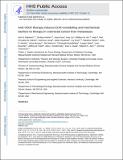Anti-VEGF therapy induces ECM remodeling and mechanical barriers to therapy in colorectal cancer liver metastases
Author(s)
Rahbari, N. N.; Kedrin, D.; Incio, J.; Liu, H.; Nia, H. T.; Edrich, C. M.; Jung, K.; Daubriac, J.; Chen, I.; Heishi, T.; Martin, J. D.; Huang, Y.; Maimon, N.; Reissfelder, C.; Weitz, J.; Boucher, Y.; Clark, J. W.; Duda, D. G.; Jain, R. K.; Fukumura, D.; Ho, William W.; Grodzinsky, Alan J; ... Show more Show less
Downloadnihms857070.pdf (1.062Mb)
OPEN_ACCESS_POLICY
Open Access Policy
Creative Commons Attribution-Noncommercial-Share Alike
Terms of use
Metadata
Show full item recordAbstract
The survival benefit of anti-vascular endothelial growth factor (VEGF) therapy in metastatic colorectal cancer (mCRC) patients is limited to a few months because of acquired resistance. We show that anti-VEGF therapy induced remodeling of the extracellular matrix with subsequent alteration of the physical properties of colorectal liver metastases. Preoperative treatment with bevacizumab in patients with colorectal liver metastases increased hyaluronic acid (HA) deposition within the tumors. Moreover, in two syngeneic mouse models of CRC metastasis in the liver, we show that anti-VEGF therapy markedly increased the expression of HA and sulfated glycosaminoglycans (sGAGs), without significantly changing collagen deposition. The density of these matrix components correlated with increased tumor stiffness after anti-VEGF therapy. Treatment-induced tumor hypoxia appeared to be the driving force for the remodeling of the extracellular matrix. In preclinical models, we show that enzymatic depletion of HA partially rescued the compromised perfusion in liver mCRCs after anti- VEGF therapy and prolonged survival in combination with anti-VEGF therapy and chemotherapy. These findings suggest that extracellular matrix components such as HA could be a potential therapeutic target for reducing physical barriers to systemic treatments in patients with mCRC who receive anti-VEGF therapy.
Date issued
2016-10Department
Massachusetts Institute of Technology. Department of Chemical Engineering; Massachusetts Institute of Technology. Department of Mechanical EngineeringJournal
Science Translational Medicine
Publisher
American Association for the Advancement of Science (AAAS)
Citation
Rahbari, N. N. et al. “Anti-VEGF Therapy Induces ECM Remodeling and Mechanical Barriers to Therapy in Colorectal Cancer Liver Metastases.” Science Translational Medicine 8, 360 (October 2016): 360ra135 © 2016 American Association for the Advancement of Science
Version: Final published version
ISSN
1946-6234
1946-6242